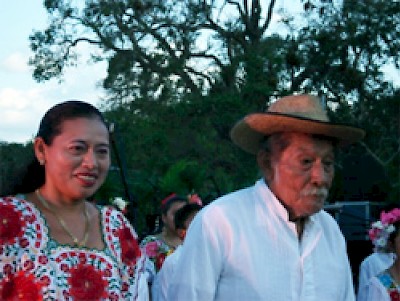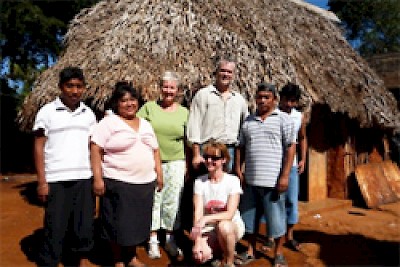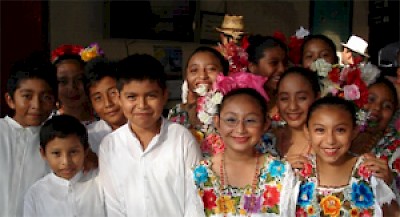Crossing Cultures Respectfully
Despite all the social changes of the past few years, respect still retains highest priority status. For traditional Yucatecans, it is so important to not publicly offend, criticize, or be scornful of another person’s choices or lifestyle. In most families, Mamá is cherished and Papá is listened to with full attention. Children do not talk back cheekily to their parents or grandparents and elders are revered. Teachers are obeyed. Younger siblings are taken care of, neighbors’ idiosyncrasies are tolerated and passers-by are greeted in the streets – “Buenos días” or “Buenas tardes” is always murmured as one walks by.
When a person comes into a room, they greet everyone there – often with kisses and endearments. If two people are speaking and another person comes into the room, the conversation stops and the newcomer is acknowledged. If someone is having a party and you bring an extra person (or persons) – even without notifying your host, the extras are welcomed as though they were at the top of the guest list.
On the other hand, if respect is not shown, the absence is palpable.
In most places in North America or Europe, showing this over-the-top courtesy is not common and so newcomers to Merida may not think to extend it. Because some Yucatecans do not have a lot of experience with the social mores of other countries, they can easily be offended if the pleasantries are not forthcoming. It is difficult to know what exactly should be done, but the basic rule of thumb is that no one should be left alone in a crowd. If you are in a group, be sure everyone is greeted and introduced to everyone else present. If someone new comes into the room (even if they are, in fact, interrupting) they should be made to feel welcome. Inclusion is very important.
As guests in this country, we need to take a back seat sometimes. Yucatecans do not really appreciate our analysis of all that’s wrong with this city. We need to be very sensitive of what we say when native-born people are within earshot. I was at a party once and there was a group of foreign men loudly discussing the merits of the local supermarket…
“Why don’t ‘they’ have a properly equipped hardware section?” one fellow asked the others.
“I know what you mean, I was looking for 1¼ inch screws the other day, and do you think I could find them?” answered his buddy.
They continued to criticize the way the store was stocked, how poorly it was run, and then went on to complain how “hardly anyone speaks English”. My Yucatecan husband was not amused, and when we got into the car, he exploded,
“Who do those guys think they are? To start with most people who shop at that store don’t ever have need for 1¼ inch screws; they have workmen who buy them… at a hardware store! Secondly, we are on the metric system here, and thirdly, we speak Spanish in “this” country!”
I don’t think the men had any idea that they were being offensive, but Jorge would have nothing to do with them after that – ever, ever, ever!
Neither are Yucatecans at all interested in hearing about how products / services / schools / government / etc. “are better run back home”. I’ve known women who claim even Jello is “not as good” here! I’ve had it pointed out to me that Yucatecans themselves will often comment about inadequacies they encounter, but that’s different… It’s OK to berate your own culture and way of doing things, but you don’t like to hear outsiders do so. We can draw a parallel with this and how we feel about our families. We can criticize them all we want and do so very vocally but if anyone else does – watch out!
It is best to keep our opinions to ourselves when we are in the presence of Yucatecan friends and acquaintances. But sometimes, this is unavoidable; how can we state what we feel without coming across as rude? Let’s go back to the case of the fellow who needed 1¼ inch screws. Instead of criticizing the store (which was interpreted as a badmouthing the whole culture!) it would be better to ask,
“Hey, I tried to buy 1¼ inch screws the other day; the store I went to didn’t have them… where can I go?”
This may sound like taking things to ridiculous limits, but the sensitivity is there, and you have to work around it.
I’ve heard newcomers speak hotly and loudly about so many situations and circumstances they don’t understand and often they preface their complaint with,
“What’s the matter with these people / this country / this government …?”
Once I attended a concert that was quite late getting started… An English voice beside me exclaimed,
“Why can’t anything here ever start on time?”
All the Yucatecans in the vicinity had very offended looks on their faces; I was most uncomfortable, and the English-speaker was poised to continue with his commentary…
“Remember, lots of people here understand English; be careful what you say!” I whispered to him. To his credit, he kept quiet after that.
It’s also a good idea to refrain from speaking English loudly in public. Try not to call out at full volume when you see a friend down the isle of the grocery store. Neither should you laugh uproariously because those around will not understand the joke and could conclude you’re laughing at them. Yucatecans are not used to boisterous North American ways and after all, we are in their country…
Once in a while, you will probably encounter a Yucatecan with very strong opinions about “your” country. I have had this experience and I usually cut the comments off by saying,
“Let’s not confuse the politics with the people!”
This usually softens the attack, but if it doesn’t, I continue,
“As a foreigner here, I am not permitted to make political statements; I don’t want to create controversy, so let’s talk about something else.”
The bottom line is, that as transplants in Yucatan, we have to adjust our yardstick to the status-quo in Merida, and avoid making direct criticisms of everything that is not satisfactory to us. We need to include people and be sensitive to their needs. We need to be tolerant of what we encounter around us and save our evaluations until we are in the privacy of our own homes. This isn’t always easy, but if you can manage to adopt this behavior, you will be considered muy educado – well mannered. People will warm up to you and treat you with the same respect you’ve shown them.
Editor's Note: Joanna van der Gracht de Rosado is a writer from Vancouver, Canada who has been living in Merida, Yucatan for over 30 years. She is the author of Tomando Agua de Pozo (Taking Water from the Well), which recounts many of her experiences assimilating in Mexico. You can read her Yucatan Living interview here and visit her blog here.












Comments
Rosa 16 years ago
I am from California, USA and my parents are from Mexico so I can totally relate to cultural differences. One needs to be sensitive to other people's cultures if they want to succeed in a foreign country. I am living proof of that. I treat others the way I would like to be treated- plain and simple. Muchas Gracias Jaonna for the great article that you have written and shared with us!
Reply
FireDog 16 years ago
Buenos dias y muchas gracias!!!
Reply
Patty 16 years ago
I'm glad I don't know any expats like those. I thought it was obvious common knowledge not to criticize the customs and habits of a country you're visiting. I knew that before I came, and so did all the expats I know here.
Reply
Trev 16 years ago
It's a good article for sure, and very true. My wife and I are as courteous as we can be every time we visit the Yucatan and, for the most part, the locals have returned the sentiment. I believe we did run into a communication barrier, however, last time we visited Merida. We were shocked at the way we were treated from hotel staff, restaurant staff and locals alike. To this day I'm unsure what we did wrong but I've come to the reluctant conclusion that it just happens sometimes. We're not easily scared off, however, and once our Spanish is better we'll return to Merida for 'round 2'. I think that there is an aloof attitude that can easily be min-interpreted as rudeness by 'gringos' like us. Sometimes people here in Canada are just way too effusive and 'sorry' for their own good. The fact that we plan to retire in the Yucatan should say enough about our unabashed love for the place and the people. It's certainly true that a countries wealth or 'global standing' has absolutely no bearing on how close it is to heaven.
Reply
CasiYucateco 16 years ago
PaulB,
I believe the "working class" people would leave the room thinking that you were a fine example of Felipe Carrillo Puerto's inclusion and recognition of all peoples and that it is sad "la casta divina" continues in their elite ways. (And yes, they definitely know their history and his legacy.)
Just a hunch from having done the same. I shake the hands of everyone: from la senor y senora de la casa, to the licensionados, to the ingeneros, to the arquitectos, to the albaniles and all their helpers.
Reply
Jorge 16 years ago
Buenas Noches!
Reply
Joanna van der Gracht de Rosado 16 years ago
Thanks for your comment Paul.
There is no doubt that this society does have multiple socio-economic groups. In my experience when a person enters a room and there are people from different groups present, everyone is acknowledged with at least a nod; then peers greet one another.
You do not need to feel emarrassed if you "salute" everyone. However as you become better acquainted with people, you'll be more comfortable "saluting" those you know best.
You have to do what feels right to you. Personally, when I don't know the person (male or female, upper class or not) I do not extend a kiss or hug. But if they come at me with one, I do not turn away either. My standard greeting is a sincere smile, direct eye contact and the phrase, "Es un placer" (It's a pleasure) Things take off from there... one way or another!
Joanna
Reply
PaulB 16 years ago
When upper class Yucatecos enter a room that has both workers and upper class people present, the upper class people will often only acknowledge other the other upper class people. They seem to include us gringos as part of the upper class. I think I sometimes have embarrassed all by saluting the workers present equally with the upper class.
Thanks for the interesting article !
Reply
Agnes Logan 16 years ago
Joanna, many thanks for a great article. We have lived in many countries round the world and what you say is true in all of them. One of the reasons we chose to live here is the freindliness and relaxed attitude of the people as well as the fact that youare not refulated in everything and taxed out of hand to pay for this. So we may miss out on some services (garbage collection at the beach for one) becauase of this, but as many have said, if you don't like it here go home.
Brenda, we have found that the kids in Mexico, at least in the Yucatan, are far better behaved than many in other countries, including USA. This is probably because families are far more important here and children are taken out and not left at home with a babysitter all the time.
Reply
Sara Lilley 16 years ago
When I lived for a short time in Wyoming, a state where many people moved due to the oil business, I saw several bumper stickers that read," I don't care how you did it where you came from."
Says it all!
Reply
Tonia Kimsey 16 years ago
Joanna.
Having lived 12 years in Mexico we know that your words and advice are so perfect. We must always remember we are guests in this country, and the people are very sensitive about comments from foreigners about their country, as people around the world all feel the same.
Mil Gracias
Tonia
Reply
(0 to 11 comments)Next »